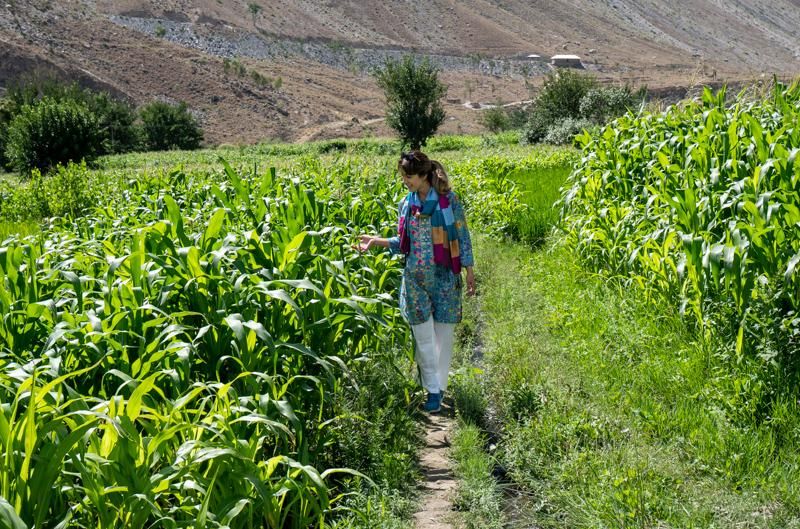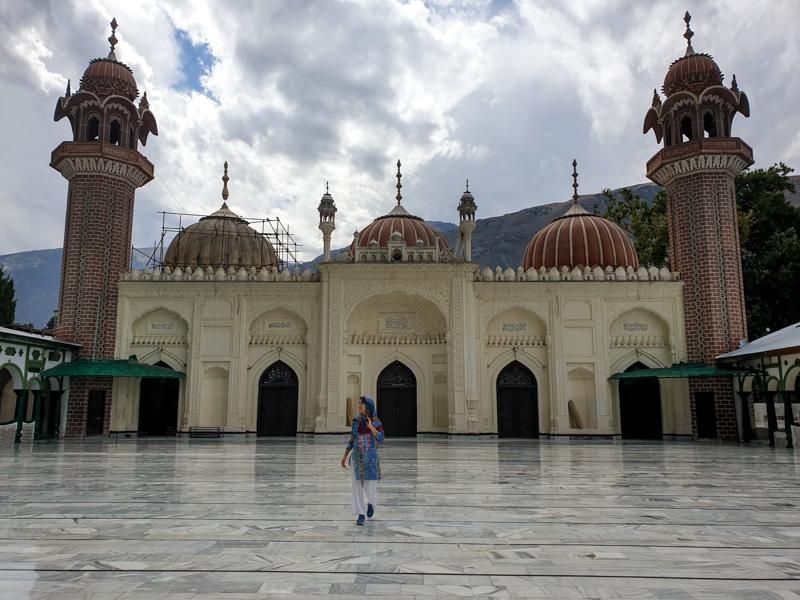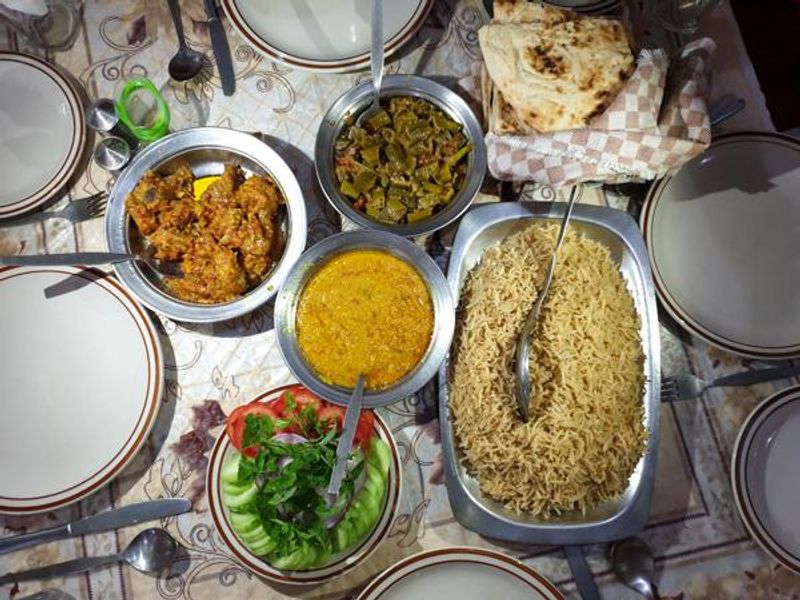When we planned our trip to Pakistan and told our friends and family about our decision to travel there, some of them asked us if we were crazy while others tried to be a little more respectful and asked: “Why Pakistan?”. They were mostly concerned about whether Pakistan was a safe place to visit or not.
If you are reading this article I assume you are thinking of going to Pakistan or you already made up your mind and want to gather more information before your trip. It doesn’t matter in which category you fit in, in this article I will share all you need to know before travelling to Pakistan.
This piece will help you plan a better trip and, as a result, you will enjoy your time in Pakistan even more.
Is it safe to travel to Pakistan?
When I posted my first Instagram story, I was bombarded with a particular question: “Is Pakistan safe to visit”? Apparently, it didn’t matter if people saw me strolling happily in the beautiful mountains of Pakistan, they wanted to be reassured about my safety by asking me directly.
So, let’s talk about the most asked question when you plan a trip to Pakistan.
If you planning a visit to Pakistan, you should keep in mind that travelling to Pakistan needs more research compared to other destinations. You need to try to be smart when drafting your itinerary.
Not all areas in Pakistan are the same, so you will need to be up to date about what is the current situation of the places you want to visit. There are some sectarian conflicts and political instability in some parts of the country. Above all, Pakistan often experiences natural disasters in some particular places, due to the several major earthquake zones.
The majority of Pakistan is safe, but it is wise to have a local guide with you when you travel around the country.

We flew to Islamabad, where we met our local guide from Trango Adventure, who brought us to the northwest side of the country, Kalash Valley, close to the border with Afghanistan.
We never felt unsafe, despite seeing a lot of armed police checkpoints. In some parts of the country, like the lush forest, armed police will escort tourists.

During our trip, we were only followed by armed police once at one of the attractions in Swat. We didn’t feel uncomfortable or threatened at all, but we were told it was for our own safety.
Visa for Pakistan
Pakistan began promoting tourism in the country by introducing a new e-visa system for 175 nations. Most nationalities can now apply online for a Pakistan visa. The prices vary depending on the country of origin.
The process is pretty straightforward, you should register on this website, fill the online form, upload your documents and pay for your application. We did exactly that, but we were still asked to bring our passports to the High Commission of Pakistan in London in person. They didn’t keep any of our documents, they just wanted to see the originals, and a week later we were issued our visas via email.

The short-term tourist visa is valid for 3 months and for a single entry which allows tourists to stay up to 30 days in the country.
Alternatively, you can take your documents to your closest Pakistan embassy and apply directly. You shouldn’t need to book an appointment in advance.
Exchanging Money in Pakistan
It might not be easy to exchange your currency into Pakistani Rupees at home before your trip to Pakistan. We tried to go to different exchanges in London before our trip, but we couldn’t find one that issued them.
When you are in Islamabad, you have more options to exchange your US Dollars, Euros or Pounds. The exchange rate at the Islamabad airport is not great. You can go to the city and easily find various Foreign Exchange Bureaus.

Some of the ATMs support Visa and Mastercard, but it is not the case for all banks and all ATMs, we had to try a few before finding one that allowed us to withdraw cash using our Visa card. So keep in mind that if you want to travel around the country, in many places you might not be able to exchange your money. It is much easier to exchange your currency from banks, ATMs or even Foreign Exchange in Islamabad and carry Rupees around. It is advisable to carry a reasonable amount of cash with you since most of the places in the country don’t accept cards including some hotels.
Hotels and accommodation in Pakistan
There are various options for accommodation and hotels in Islamabad. Depends on your budget you can choose where to stay. Generally speaking, Pakistan is a cheap country to visit, but some high-end chain hotels like Marriot and Serena will cost more.
Most hotels in the capital city of Pakistan accept Visa and Mastercard, some even accept American Express. You can also book your accommodation online, but you should pay later at most hotels.
The situation is different out of Islamabad. When you try to search for hotels online in smaller cities, you will probably only have a few options. You should know that not all hotels and guest houses in Pakistan are on booking websites. Even if you find one and book it, you will probably be asked to pay at the property rather than online.

I recommend you to book your accommodation in Pakistan with the help of your local guide or if you don’t have a guide ask locals travel agencies to help you out.
We noticed that locals book hotels and guest houses by calling in. Also, most likely, the prices will also be cheaper than the ones you see online.
For instance, we arrived in Swat late at night and our guide booked us a suite in Serena Hotel. We didn’t discuss the price since we were very tired. We checked the price online and we were quite surprised to see that our room was priced at 23,000 RS (around £120 or $145). In the morning at check out we only paid 13,000 RS (around £67 or $83), that’s quite a difference. Don’t be shy and ask locals to help with booking your accommodation.
What to wear in Pakistan
According to Pakistani laws, you can wear anything you want in the country, but I wouldn’t recommend you to do as you please. Pakistan is not only an Islamic country but it is very traditional. Both men and women should dress up modestly.
What should men wear in Pakistan?
Pakistani men wear a traditional costume called Shalwar Kameez which is a long shirt or tunic with loose trousers. If you want to look like a local you can purchase these outfits pretty much anywhere.

Otherwise, you can simply wear jeans and a t-shirt. You might see some locals with shorts in some areas in Islamabad and Murree, but I wouldn’t recommend wearing shorts in small towns and villages.
What should women wear in Pakistan?
Pakistani females wear a traditional Shalwar Kameez which is similar to the men’s costume. The main difference is the female's outfit is very colourful while men wear plain Shalwar Kameez. You can purchase it at any market in Islamabad.
You can also wear loose trousers with a long full-sleeved shirt covering your bottom. You can also wear an ankle-length skirt instead of trousers. Avoid wearing shorts, tight or short tops and skirts or even sleeveless tops.

You will see a lot of women not covering their hair in Islamabad but the situation varies region by region. In some areas, females not only cover their body and head, but they cover their faces, too.
It is advisable to carry a shawl or a large scarf with you so you can cover up when necessary, including when visiting mosques and other religious attractions.
Internet and Buying a SIM Card in Pakistan
Buying a Sim Card as a foreigner in Pakistan is not as easy as many other countries. You can’t buy it at the airport, you might be able to get a prepaid SIM Card at Franchise. You must have your passport with you to be able to get one.
If you are going to travel around the country, do some research to see which operators have better coverage in the areas you want to travel to.

Keep in mind that internet is cheap in Pakistan and the speed is usually good enough to share pictures, call your family via WhatsApp or post stories on Instagram.
Food in Pakistan
We had not tried Pakistani food before our trip to the country. We didn’t know what to expect. I must say that we really enjoyed all of the Pakistani dishes we tried during our trip.

Pakistani food can be spicy, but not extremely spicy. If you, like me, don’t have a strong stomach ask for less spicy food. There are a variety of delicious options when it comes to Pakistani food.
There is no pork in the country, but you can find other types of meat like chicken, fish, lamb, beef and even goat everywhere in Pakistan. Unfortunately, most Pakistani dishes are not vegetarian-friendly, but there are some vegetarian dishes.
Get ready to be the centre of attention
There aren’t many foreign tourists in Pakistan. Because of this, most Pakistani are not used to tourists. They might stare at you or come to you for small talk or they might even ask for a selfie. This is how they try to show their hospitality.
Shaking hands is the way locals show respect to their guests. Some people because of their religion don’t shake hands with the opposite sex. For this reason, it is better to wait for them to offer their hands so you can have the appropriate response.

People in Pakistan are very kind and friendly. They want you to feel welcome and you will probably get invited for tea or sometimes even dinner.
If you don’t like attracting attention, it might be a good idea to dress up like the locals. I can’t guarantee that you wouldn’t stand out, but different clothing makes it obvious that you are not from the country.
Amazing landscapes and tough roads in Pakistan
Pakistan is home to some of the highest peaks in the world. There are amazing landscapes and beautiful mountains all over the country.

But, getting somewhere to go for a hike is not very convenient. There aren’t many motorways in the country, especially in the north. The roads can be very tough and sometimes quite dangerous. This is why travelling by car from one part of Pakistan to another can take hours and sometimes even days.

If you plan to visit different parts of the country, you should opt for a longer trip and factor in the time it takes to move around. You can also fly domestically, but the number of daily flights is limited, the price is usually quite high and flights get cancelled all the time due to bad weather.
Carry some toilet paper
Some of the public toilets in Pakistan don’t provide toilet paper at all, especially when you are on the road. Toilets at the airport and the malls do provide it but you should sometimes ask the cleaner to give it to you. You might not be able to find the cleaner, or he/she might have run out of toilet paper, so it is better to carry your own.
Take your trash back with you
When you travel to rural areas in Pakistan you will see a lot of rubbish in the streets or even in nature including plastic bottles, plastic bags and other things.
We also saw a group of young people help with cleaning up some areas, but they were not sure what they were supposed to do with the pile of rubbish they collected.

After talking to some locals we found out there isn’t a proper waste disposal system in many areas in Pakistan. Some villages have to send their rubbish to the bigger cities which can cost them a lot.
Of course, it will not be possible to clean and collect all of the rubbish wherever you go, but it would help if you could collect your own trash and take it back to Islamabad or even to your own home if you want to go the extra mile.
On your way back home
You must keep in mind that the security won’t let you inside Islamabad’s airport without first seeing a receipt of your flight’s booking or a boarding pass. It can be directly from your phone, so no need to print anything.
We had some pretty stressful time once we got back to Islamabad airport to fly back home. Unfortunately for us, we just gave back our SIM card to our local guide outside the airport and we didn’t have access to the internet to show them our booking and we had to jump through some hoops before being able to get inside and check-in for our flight’s departure. Make sure you do not end up in our situation and enjoy your trip to this wonderful country.




